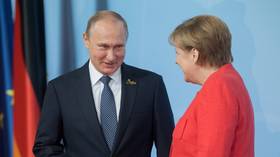Defending European security: Putin and Merkel join forces to resist cynical US sanctions on controversial Nord Stream 2 pipeline

Relations between Russia and Germany are at an all-time low, but nothing brings people together like a common enemy. In its bid to fight a new cross-continental gas pipeline, Washington seems to be offering itself up for the role.
Earlier this week, US Senator Ted Cruz (R-Texas), a big game hunter who frequently sets his sights on Moscow, insisted that a new wave of punitive measures would finish off the planned Nord Stream 2 for good. He told an event run by pro-NATO lobbyists the Atlantic Council on Wednesday that “this project,” in his opinion, “will never be launched and gas will never be launched through the pipeline.” He added that “the second wave of sanctions” would be approved in the near future.
His sentiments are shared by the US State Department, who used the same meeting, entitled ‘How to Stop Nord Stream 2’, to confirm that Washington is still aiming to sink all hopes of the underwater pipeline being completed. Deputy Assistant Secretary of State Stephen Biegun told his hosts that “we don't want to impose sanctions, but we'll use this authority and these tools to stop the project,” and added, “We’ll stop this pipeline.” Backed by Russia’s state-owned Gazprom, as well as German, French and British energy companies, Nord Stream 2, if completed, would link Siberia’s gas fields with consumers in Western Europe.
Also on rt.com Bombshell report reveals how Ukrainian lobbyists pitted US against EU over new Russia-Germany Nord Stream 2 pipelineWashington has warned hundreds of construction firms about their involvement in the project, which it calls a “grave threat” to Europe’s “energy security, and American national security.”
However, Berlin has stayed steely in the face of American attempts to force European companies to quit the project. Earlier this month, German Chancellor Angela Merkel insisted that, when it comes to the pipeline, “the position of the federal government remains unchanged from that of recent years.” She admitted that relations with Russia, where the pipeline will originate, were under strain over the alleged poisoning of opposition figure Alexey Navalny, but argued that it would be wrong to conflate the two.
The US has also been accused of cynicism in its opposition to more Siberian gas underneath the Baltic Sea. According to Politico, a common refrain in Berlin is that “the Americans don’t care about Russia, they just want to sell us their fracking gas.”
More than 40,000 American soldiers and support staff are based in Germany, and Washington considers the country one of its closest allies on the continent. The row over Nord Stream 2 represents a rare transatlantic split for Merkel, and it is understood that senior members of her government have expressed genuine frustration with the US over its policy on the project.
German Foreign Minister Heiko Maas told journalists earlier in December that he hoped to come to an agreement with the incoming US president, Joe Biden, over the contentious project. “The European Union sees the sanctions introduced against the project as an illegal step and takes a different view of the political aspect when it comes to the issue,” Maas said in an interview with German weekly news magazine Der Spiegel.
In what seems like an uncommon occurrence, Merkel’s staunchest ally in the defense of the gas link is Russian President Vladimir Putin. On Thursday, at his annual end-of-year press conference, he reiterated Russia’s determination to finish the project. “Nord Stream 2 is beyond all doubt, it is absolutely obvious...a beneficial [project] for the economy of Europe in general and for Germany in particular.”
“I hope that the new [US] administration will treat its partners and allies with respect and would not insist that they neglect their national interests,” Putin said. Meanwhile, construction on the pipeline has continued unabated.
Like this story? Share it with a friend!















